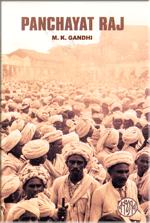
P.O. SEVAGRAM, DIST.WARDHA 442102, MS, INDIA. Phone: 91-7152-284753
FOUNDED BY MAHATMA GANDHI IN 1936
Panchayat Raj

NATURE CURE
Written by : M. K. Gandhi
Table of Contents
- Publisher's Note
- Why The Village Movement?
- Panchayats in Pre-Independence Days
- Panchayats in Independent India
- My Idea of Village Swaraj
- An Ideal Village
- Non-violent Rural Economy
- All-round Village Development
- Village Sanitation
- Rural Medical Relief
- Revival of Village Industries
- Charkha In The Villages
- Other Village Industries
- Duty of Congress Ministries
- Co-operative Cattle Farming
- Village Exhibitions
- Lok Sevak Sangh
- Samagra Gramseva
- Shanti Dals in Villages
About This Book
Written by : M. K. Gandhi
Compiled by : R. K. Prabhu
First Edition :10,000 copies, February 1959
I.S.B.N :81-7229-139-6
Printed and Published by :Jitendra T. Desai,
Navajivan Mudranalaya,
Ahemadabad-380014
India.
© Navajivan Trust, 1960
Download
Chapter-4: My Idea of Village Swaraj
My idea of Village Swaraj is that it is a complete republic, independent of its
neighbours for its own vital wants, and yet interdependent for many others
in which dependence is a necessity. Thus every village's first concern will
be to grow its own food crops and cotton for its cloth. It should have a
reserve for its cattle, recreation and playground for adults and children.
Then if there is more land available, it will grow useful money crops, thus excluding ganja, tobacco, opium and the like. The village will maintain a village theatre, school and public hall.
It will have its own waterworks ensuring water supply. This can be done
through controlled wells and tanks. Education will be compulsory up to the
final basic course. As far as possible every activity will be conducted on
the co-operative basis. There will be no castes such as we have today with
their graded untouchability. Non-violence with its technique of Satyagraha
and non-co-operation will be the sanction of the village community. There
will be a compulsory service of village guards who will be selected by
rotation from the register maintained by the village. The government of the
village will be conducted by the Panchayat of five persons, annually
elected by the adult villagers, male and female, possessing minimum
prescribed qualifications. These will have all the authority and
jurisdiction required. Since there will be no system of punishments in the
accepted sense, this Panchayat will be the legislature, judiciary and
executive combined to operate for its year of office.
Any village can become such a republic today without much interference, even
from the present Government whose sole effective connection with the
villages is the exaction of the village revenue. I have not examined here
the question of relations with the neighbouring villages and the centre if
any. My purpose is to present an outline of village government. Here there
is perfect democracy based upon individual freedom. The individual is the
architect of his own government. The law of non-violence rules him and his
government. He and his village are able to defy the might of a world. For
the law governing every villager is that he will suffer death in the defence
of his and his village's honour.
There is nothing inherently impossible in the picture drawn here. To model such a
village may be the work of a lifetime. Any lover of true democracy and
village life can take up a village, treat it as his world and sole work, and
he will find good results. He begins by being the village scavenger,
spinner, watchman, medicine man and school-master all at once. If nobody
comes near him, he will be satisfied with scavenging and spinning.
Harijan, 26-7-1942